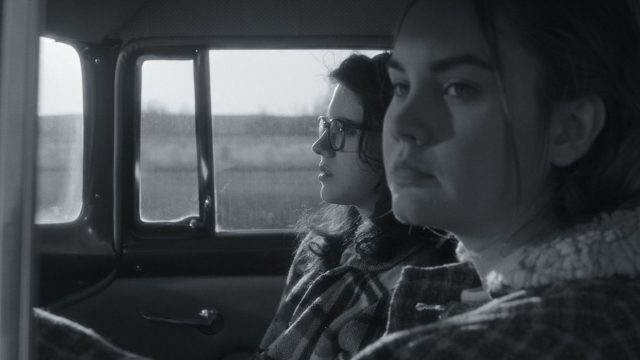Sundance 2019: To the Stars, by David Bax

Not unlike her last film, co-directorial effort Land Ho!, Martha Stephens’ To the Stars is possessed of an earnestness that borders on being corny. That’s in no way a complaint. Sincerity is a trait too hard to come by these days. And the two charming and fully embodied performances at the film’s center, from Liana Liberato (from David Schwimmer’s Trust) and Kara Hayward (well on her way to being known as more than the girl from Moonrise Kingdom), certainly don’t hurt.
Iris (Hayward) is an awkward high school outcast in her small, early 1960s Oklahoma town. When a new girl named Maggie (Liberato) moves to town from Kansas City, even the resident mean girls, led by Madison Beaty’s Clarissa, are taken in by her cosmopolitan pedigree. But when Maggie takes a liking to Iris–like Buffy Summers choosing to befriend Willow Rosenberg instead of Cordelia Chase–she changes the dynamic of Iris’ world, Clarissa’s world, the high school and, eventually, the whole town itself.
Stephens isn’t quite breaking any molds here but her belief in and passion for her material shines through every scene. Backing her up are cinematographer Andrew Reed (Gemini) with nostalgic black and white imagery; composer Heather McIntosh, whose romantic, whimsical score sets the tone right from the beautiful opening shots of the night sky; tactile period costumes from Kiersten Hargroder; and a hair and makeup team whose job is crucial to the plot and who more than rise to the challenge.
While Stephens has a good sense of time and place, Maggie’s sensibilities are sometimes oddly, suspiciously modern. If anything breaks the movie’s spell, it’s the creeping sense, in Maggie’s early scenes, that her social attitudes are coming from a distinctly 2010s viewpoint. Then again, everything is up to date in Kansas City.
To the Stars‘ narrative follows an organic logic and has a plethora of treasures to unveil. But most of the film’s success comes from Stephens’ deftness at painting local color and drawing specific, believable characters out of every member of her cast, not just the leads, making way for comedy in some cases (like Tina Parker’s snappy turn as one of the popular girl’s moms) and deep tragedy in others (in a just world, Jordana Spiro would already be earning awards chatter as Iris’s pitifully bitter mother). If you find yourself sometimes rolling your eyes at the movie, it will likely be in the same manner you do with someone you know and love. Sincerely.





























